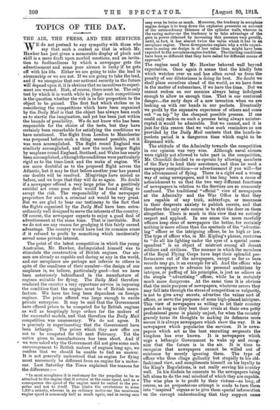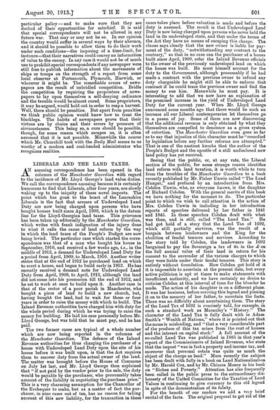TOPICS OP THE DAY.
THE AIR, THE PRESS, AND THE SERVICES.
WE do not pretend to any sympathy with those who say that such a contest as that in which Mr. Hawker has just given a memorable display of pluck and skill is a mere draft upon morbid emotions, and an invita- tion to foolhardiness by which a newspaper gets the advertisement and some poor airman is lucky if he gets off with his life. Either we are going to take the lead in airmanship or we are not. If we are going to take the lead, and if we recognize that our national security in the future will depend upon it, it is obvious that no incentives to experi- ment are wasted. Risk, of course, there must be. The only test by which it is worth while to judge such competitions is the question whether the risk is in fair proportion to the object to be gained. The first fact which strikes us in considering the competitions which have been organized by the Daily Mail is that the object has always been such as to startle the imagination, and yet has been just within the bounds of possibility. We do not know who has been responsible for the choice of the tests, but they have certainly been remarkable for satisfying the conditions we have mentioned. The flight from London to Manchester was proposed before such a thing seemed possible, yet it was soon accomplished. The flight round England was similarly accomplished, and now the much longer flight by seaplane round England, Scotland, and Wales has nearly been accomplished, although the conditions were particularly rigid as to the time-limit and the make of engine. We are more doubtful as to the proposed flight across the Atlantic, but it may be that before another year has passed our doubts will be resolved. Misgivings have misled us before, and we hope that they will do so again. No doubt if a newspaper offered a very large prize for a positively suicidal act some poor devil would be found willing to accept the risk. The responsibility of the newspaper proprietors for such a criminal act would be very great. But we are glad to bear our testimony to the fact that the flights organized by the Daily Mail have been extra- ordinarily well designed to serve the interests of the country. Of course, the newspaper expects to enjoy a good deal of advertisement at the same time. That is inevitable. But we do not see any reason for grudging it this fairly earned advantage. The country would have lost its common sense if it refused to profit by something which incidentally served some private interest.
The point of the latest competition in which the young Australian, Mr. Hawker, distinguished himself was to stimulate the construction of British engines. Our air- men are already as capable and daring as any in the world, and our aeroplanes are perhaps not inferior to others in spite of the smallness of their number—the design of our seaplanes is, we believe, particularly good—but we have been notoriously behindhand in the manufacture of engines suitable for flying. The Daily Mail therefore rendered the country a very opportune service in imposing the condition that the engine must be of British manu- facture. We have too long been dependent on foreign engines. The prize offered was large enough to excite private enterprise. It may be said that the Government have offered prizes to be competed for by British engines as well as temptingly large orders for the makers of the successful models, and that therefore the Daily Mail competition was unnecessary. We do not agree. It is precisely in experimenting that the Government have been lethargic. The prizes which they now offer are not to be competed for till next February. Yet the notice given to manufacturers has been short. And if we were asked why the Government did not give some such encouragement to British makers of engines long ago, we confess that we should be unable to find an answer. It is not generally understood that an engine for flying must necessarily be different from an engine for a motor- car. Last Saturday the Times explained the reasons for the difference :— " In most aeroplanes it is customary for the propeller to be so attached to the engine that it rotates at the same speed, and as a consequence the speed of the engine must be suited to the pro- peller and not to itself. This limits the revolutions to some 1,200 a minute, whereas in an ordinary motor-car the maximum engine speed is commonly half as much again, and in racing cars may even be twice as much. Moreover, the tendency in aeroplane engine design is to keep down the explosion pressures on account of the extraordinary thinness of the cylinder walls, whereas in the racing motor-car the tendency is to take advantage of the gain in power obtained by increasing this pressure very greatly, until, in fact, it has almost twice the value which it has in an aeroplane engine. These divergencies explain why a wide experi- ence in racing car design is of less value than might have been expected to the aeroplane engine-builder. The limiting conditions have been so different that they have called for different means of approach.'
The engine used by Mr. Hawker behaved well beyond expectation. Once again it seems that the kindly fate which watches over us and has often saved us from the penalty of our dilatoriness is doing its best. No doubt we shall place ourselves ahead of the world, as we have done in the matter of submarines, if we have the time. But we cannot reckon on our enemies always being indulgent enough to allow us enough time. That is our continual danger—the early days of a new invention when we are looking on with our hands in our pockets. Eventually we profit by the expensive experience of others and come out " on top " by the cheapest possible process. If one could only reckon on such a process being always uninter- rupted it would be admirable. But we cannot, and it is just for this reason that we value such reminders as are provided by the Daily Mail contests that the hands-in- pockets period is a dangerous time which ought to be dispensed with.
The attitude of the Admiralty towards the competition in our opinion was very wise. Although naval airmen were rightly not allowed to take part in the competition, Mr. Churchill decided to co-operate by allowing members of the Navy to lend their assistance, and thus he used a. newspaper competition—or advertisement if you will—for the advancement of flying. There is a right and a wrong way of using newspapers, and it has long been a cause of astonishment to us that the two very different functions of newspapers in relation to the Services are so commonly confused. The traditional " official " view of newspapers at the Admiralty and the War Office is that they are capable of any trick, subterfuge, or meanness in their desperate anxiety to publish secrets, and that therefore the only safe course is to shut the door on them altogether. There is much in this view that we entirely respect and applaud. In one sense the more carefully officers keep clear of newspapers the better, for certainly nothing is more odious than the spectacle of the "advertis- ing " officer or the intriguing officer, be he high or low. The type of officer who, in Mr. Kipling's phrase, contrives to " do all his fighting under the eyes of a special corre- spondent" is an object of mistrust among all decent soldiers and civilians. The manner in which the members of the Royal Flying Corps have kept their splendid per- formances out of the newspapers, except so far as bare, records may go, is an example for all. And the officer who uses newspapers to advance his 'personal ambitions by intrigue, or puffing of his principles, is just as odious as the simple " advertising" officer, while he is 'certainly much more dangerous. At the same time it is obvious that the main purpose of newspapers, whatever errors they may fall into through the stress of competition or vulgarity, is not to give away secrets, advertise the vainer sort of officer, or serve the purposes of some high-placed intriguer. This view of newspapers as willing to let their country perish so long as they beat their rivals at their own petty professional game is plainly unjust, for when the country gravely turns its thoughts to making its defences more secure it is always newspapers which show the way. It is newspapers which popularize the services. It is news- papers which act as the best recruiting sergeants the kingdom has ever known. It is newspapers which urge a lethargic Government to wake up and recog- nize that the future is in the air. It is time to recognize that newspapers cannot be willed out of existence by merely ignoring them. The type of officer who thus clings gallantly but stupidly to his old- fashioned view, and compliments himself on his loyalty to the King's Regulations, is not really serving his country well. In his disdain he consents to the newspapers being left alone to do the real mischief of which they are capable. The wise plan is to profit by• their virtues—so long, of course, as no preposterous attempt is made to turn them into " inspired " organs or to give them special information on the corrupt understanding that they support some- particular policy —and to make sure that they are docked of their opportunities for mischief. It is said that special correspondents will not be allowed in any future war. That may or may not be so. In our opinion the country would suffer in several ways by their absence, and it should be possible to allow them to do their work under such conditions—the imposing of a time-limit, for instance—that their narratives could convey no information of value to the enemy. In any case it would not be of much use to prohibit special correspondents if any newspaper were still free to publish information about the movements of ships or troops on the strength of a report from some local observer at Portsmouth, Plymouth, Harwich, or wherever it might be. The remediable errors of news- papers are the result of unbridled competition. Bridle the competition by requiring the proprietors of news- papers to lay upon themselves a self-denying ordinance and the trouble would be almost cured. Some proprietors, it may be argued, would hold out in order to reap a harvest. Well, there should be penalties. But apart from penalties we think public opinion would know how to treat the blacklegs. The habits of newspapers prove that their virtues are by choice and their errors by pressure of circumstances. This being so, a cure should be possible, though, for some reason which escapes us, it is often assumed that it is not possible. Meanwhile the course which Mr. Churchill took with the Daily Mail seems to us worthy of a modern and cool-headed administrator who recognizes realities.



































 Previous page
Previous page